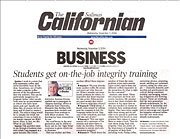Integrity Matters
November 3, 2004
Students get on-the-job integrity training

 Question: (E-149)
Question: (E-149)
Dear Jim:
I work in a store that sells expensive coffee, and we're
incredibly busy all the time. Sometimes, out of habit,
we make a regular coffee instead of the decaffeinated
that was ordered. This can be particularly dangerous
for pregnant ladies, older people (who may be on pacemakers)
or others who have heart issues and can't handle caffeine.
But, of course, we're so busy, and it's hard to waste
a drink. The ethical thing would be to remake the drink,
but sometimes it was so hard, so we simply claimed we
didn't know, when, in fact, we did. What do you think?
 Response:
Response:
This question came to me through a business class with
which I am engaged, as a guest lecturer. The course instructor,
Suzanne Kroeze, enabled me to participate in "distance
learning" efforts at California State University,
Monterey Bay, fielding both questions from students and
responses from students to their fellow students. The
learning has been tremendous, for me.
My confidence in the next generation and its ability
to know and do the "right thing" continues
to grow. Allow me to illustrate.
First one student and then another offered these responses:
- Response A: "Fix your mistake, make
another coffee. Be certain customers get what they
pay for. When a mistake can cause health problems for
others, it's imperative that those responsible take
action. When people pay good money they expect and
deserve what they ordered."
- Response B: "Think ahead. A health crisis
caused by caffeine puts the company at risk. No
company means no job. Take care of the customers, and
they will take care of you."
- Response C: "You can legitimately tell
a customer of the mistake and allow them to make
the decision. Owning mistakes is mature and communicates
integrity."
- Response D: "Think about the number of
times the same problem arises and consider color-coded
cups to keep the different coffees separated. In
the meantime, do what is right for the customer."
Readers, take heart. These five responses are from
university students. My assumption is that these
students are workers at the same time as they are enrolled in
classes to complete their undergraduate degree.
They have been taught right from wrong and do not want
to be placed in positions where they feel forced to compromise
their values to save a dime or make a buck. They
do care about doing their jobs properly. They are aware
of the importance of integrity in all aspects
of their lives, including work. Fixing coffee, answering phones,
preparing meals, sending out communications,
caring for other people -- character, honesty, partnership
and graciousness are critical. Being consistent,
truthful, encouraging, honoring obligations and showing respect:
These are attributes that the next generation
already understands. So, for those now in leadership and
ownership roles, it is important to encourage and support the
integrity-centered behaviors this new work force
already understands.